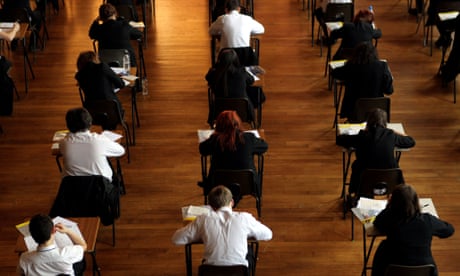
White boys from poor families in deprived areas face the double disadvantage of poverty and geography that means they abandon education earlier than their peers in better-off areas, according to new research by Oxford University.
The findings, commissioned by the Sutton Trust, reveal the powerful and long-lasting influence of background in shaping educational outcomes and suggest that income is only partly responsible for the variations in levels of education by different groups.
The research found that just 29% of white working class boys from deprived neighbourhoods in England go on to take A-levels or AS-levels in sixth form, compared with 46% of white boys who came from the same economic background but lived in more affluent areas.
A similar pattern was seen among white girls from working class backgrounds, although the gap was not as wide, and confirmed the success of pupils from Indian and Bangladeshi ethnic backgrounds. Half of all ethnic Indian pupils took three or more A-levels, as did 33% of those from Bangladeshi backgrounds.
Sir Peter Lampl, founder and chair of the Sutton Trust, said the figures showed the government’s spending review later this month needed to address underachievement within England’s poorest communities.
“It is shocking that so few white working class boys go on to take AS or A-levels. We must redouble our efforts to address these attainment gaps, and ensure that every pupil, regardless of family income, gender or ethnicity, has the chance to succeed,” he said.
Pam Sammons, professor of education at Oxford and one of the report’s authors, said: “Disadvantaged students, especially white UK boys, have poorer outcomes, and living in a poor neighbourhood compounds this.
“Unfortunately, although the pupil premium helps schools by providing extra resources for poor students, local authorities serving the poorest communities have been hardest hit by budget cuts during the last five years.”
The study followed 3,000 pupils as part of the Effective Pre-School, Primary and Secondary Education longitudinal project running since the 1990s, and found that gender, ethnicity, location and economic status were likely to determine which groups continued on in education.
It found that white students were less likely to progress on to taking AS or A-levels than students from other ethnic groups, while pupils living in poor or deprived areas were also less likely to do the same. And while boys were less likely than girls to go on to take A-levels, white boys from deprived backgrounds showed some of the lowest levels of progression overall.
“Taken together, these results again point to the powerful influence of different aspects of student background in shaping educational outcomes, particularly for 17 and 18-year-olds at A-level,” the report noted.
“The findings show that a range of factors remained important. They confirm that there is no ‘level playing field’ and that differences that emerged early in children’s lives continue to affect outcomes and life chances into adolescence.”
The lower proportion of poor white boys taking qualifications such as A-levels means they are less likely to go on to higher education, restricting their access to professional or graduate-level employment.
Recent research by the Institute for Fiscal Studies showed the proportion of white boys admitted to university was lower than almost all other ethnic groups in England.
“The differences in higher education participation between pupils from different ethnic groups are staggering,” said Claire Crawford, an academic at Warwick University and an author of the IFS research.
“We were particularly surprised to find that ethnic minority groups which have relatively low school attainment, such as those of black Caribbean, Pakistani or Bangladeshi ethnic origin, are, on average, more likely to continue into higher education than white British pupils.”
The Oxford research noted that while two-thirds of all girls took AS, A-levels or another qualifications, only 55% of all boys did the same.
“Working class underachievement is a scandal. Recent attention has been focused on the achievement of working class boys; this report highlights this is an issue for girls too,” said Becky Francis, professor of education at King’s College London.
A spokesman for the Department for Education said: “Too many young people still aren’t being given a fair shot to succeed because of where they live, which is why our education reforms are focused on delivering educational excellence everywhere.
“We are ensuring schools are fairly funded and have already maintained per pupil funding and provided an extra £390m to the least fairly funded areas. Over the coming months we will be looking at what can be done to ensure that all local areas are funded justly.”
[“source-theguardian”]
